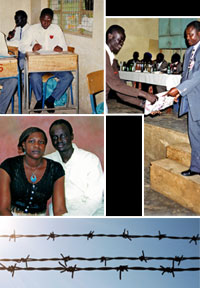|
We are very lucky to live in a democratic country. The word ‘democracy’ originates from a Greek word meaning power to the people. In Australia our government is run by people we elect. The basic principles of a democracy are that all citizens are equal before the law and that rights and freedoms are secured by law. Features of a healthy democracy Not every country has the same form of government as Australia. One such example is Sudan. Sudan’s past has been dominated by civil wars. For current information on Sudan visit the CIA worldfact book. Watch the films below to learn about life in Sudan.
In each video player below there are multiple clips. You can select the clips by using the arrow at the bottom left-hand corner of the player.
|
|
Other examplesNon-democratic governments like this are not just confined to Sudan. Below are some more examples. The liberal Weimar democracy collapsed in the early 1930s leading to World War II and the Holocaust. Citizens voted the Nazi Government into power and certain clauses in the constitution enabled Hitler to gain total power and install himself as dictator. The situation in Germany at that time serves as a reminder to all that democracies can be fragile and that citizens must be active to ensure good government. More about Germany in 1933
Government in Fiji has also been under attack. On 5 December 2006, the head of Fiji's military, Frank Bainimarama dismissed the elected Prime Minister, Laisenia Qarase. He held onto power and broke numerous promises that elections would be held. More on Fiji Sudan, Germany and Fiji are some examples where democracy has been lost at some point in time, but there are many others to research.
Mandatory detention is the act of detaining illegal immigrants for an unspecified period of time. This has occurred in Australia and it is argued by many to be an abuse of human rights.
Watch how one school student went to the United Nations Climate Change Conference in Bali in order to make a difference. There are two clips in the video player. Select the clips by using the arrow at the bottom left corner of the player. Discussion startersSovereignty allows states to control their own internal affairs without interference from other nations. State sovereignty is having supreme, independent authority over an area. More about sovereignty and human rights |

